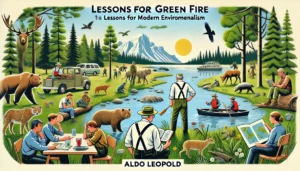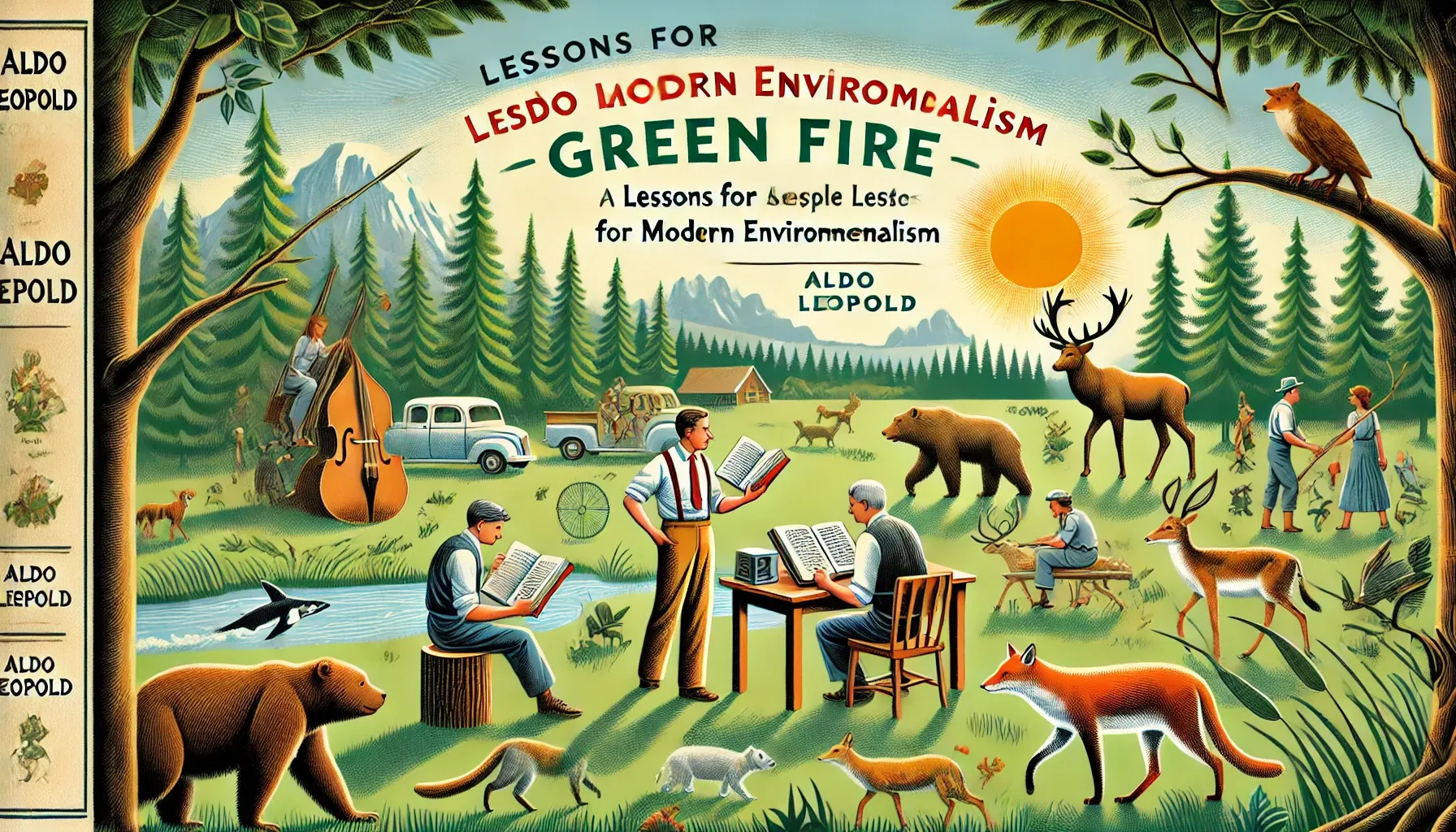Introduction
Aldo Leopold, an early environmentalist and writer, is most remembered for his work “A Sand County Almanac” and the notion of a ‘land ethic.’ It is not a coincidence that his work has had such an enormous impact on contemporary environmentalism, which seeks to find ways for human life and the rest of nature to live together harmoniously. Fittingly, the movie Green Fire: Aldo Leopold and a Land Ethic for Our Time (more on that later) is an insightful documentary about his life and thoughts. This article will take a more in-depth look at the imprint left by Leopold and explore how his philosophy offers important teachings to modern environmental movements.
Aldo Leopold’s Legacy

Early Life and Career
Aldo Leopold was born on January 11, 1887, in Burlington, Iowa. His love for nature started when he was young with the wilderness environment by his home. He went on to study forestry and was one of the earliest graduates from the Yale School of Forestry. The U.S. Forest Service formed his early career experience, during which he developed a unique vision for conservation and land management.
The Green Fire Moment
It was during the elementary conservationist’s famous “green fire” experience, when he saw a she-wolf die after being shot. He famously wrote of seeing “the green fire dying” in the eyes of a wolf and subsequently referred to that experience as marking his greatest epiphany on how ecosystems interconnect. His experience taught him how critical the role of predators was in keeping ecosystems functioning healthily and is one of the cornerstones upon which his land ethic philosophy was based.
The Land Ethic
Principles of the Land Ethic
Leopold’s land ethic delves into a philosophical position that argues from ethical and ecological standpoints the need to conserve the health and integrity of the systems. He argued that the human being should develop a new sense of land—as a community that consists of soils, waters, plants, and animals. This implies that it is unethical to see the land as cheap property but rather as a community to acknowledge we are part of. A Sand County Almanac is a book published posthumously in 1949 that contains several descriptive essays of its vision of the aforementioned land ethic. The book mainly talks about the beauty of the natural landscapes and the need to sustain them, deducing leading of excellent examples to beget more ovation. The movies that will spearhead the discussion under Leopold go by the two names, A Sand County Almanac and Green Fire, the Documentary. The critical themes include the duality of the vision Leopold presents. The themes concerning the interconnectedness of the ecosystems; individuals’ actions cause one part of the ecosystem to react which ultimately affects the other. This film has made me understand the importance of doing things together with others.
Importance of Education and Awareness
It is quite simply the basis of all moral values because something this obviously destructive reveals what remains good. Leopold understood that knowledge was key to understanding nature’s complexity and knowing why we must respect it. The modern-day environmental movements can learn this from Gandhism by encouraging environmental education and spreading awareness about sustainability.
The Environment in Public Policy: Issues and Solutions
Leopold argued for a land ethic, making all of our environmental policy and decision-making more ethical. This includes knowing and respecting nature for its own sake, not allowing economic progress to destroy the ‘natural world.’
Community-Based Conservation
One key aspect of Leopold’s approach to conservation is his insistence on community-based management, where he views the local communities as the rightful managers in looking after natural resources. This method focuses on collaboration and inspires people to respond directly to conserving efforts.
Personal Connection to Nature
Leopold expresses this bond in his writing, believing that it is necessary to have such a relationship when asking for stewardship of all other species on the Earth. Inspiring others to experience nature and create their own “green fire” moments for life-long environmental stewardship.
Case Studies and Applications
Rewilding Projects
One of the concrete applications of such a land ethic is rewilding projects that seek to return an ecosystem back to its natural state. These include reintroduction of native species, restoration of natural processes, and removal of human-made structures to allow ecosystems to heal and prosper.
Sustainable Agriculture
Leopold described the inherent capacity of nature to restore itself while also outlining a series of responsible general principles for humans interacting with ecosystems in their care. Practices such as organic farming and agroforestry promote soil health, and biodiversity encouraged through permaculture practices that are in alignment with these ideas. These habits can reduce agriculture’s environmental costs and contribution to world hunger.
Urban Green Spaces
Urban green spaces embody Leopold’s vision for integrating the natural world into human communities. Urban nature can be as diverse as parks, green roofs, and community gardens or recreation spaces that provide all residents with a connection to wildlife; improves air quality for everyone, protecting from unhealthy exposures while also supporting local biodiversity.
Conservation Policies
Most of our modern conservation policies still are dominated by the land ethic (Leopold 1949). Demarcation of the land is aimed at guaranteeing ecological integrity and encouraging reasonable utilization that could be exemplified by setting up national parks, natural corridors, protective areas, or preservation fences.
Conclusion
It is a moment in Aldo Leopold’s career that he called his ‘green fire’ experience, which prompted him to later develop the concept of land ethic. The principles underlying his holistic, ethical approach to conservation remain as applicable and relevant as ever in our over-burdened modern environment. I believe that adopting Leopold’s land ethic into our current environmental movements will help all of us to develop a more meaningful engagement with nature, encouraging sustainable behavior and perpetuating an overall sense of responsibility for the health and wholeness of this planet. With his scientific work, advocating for bans on hunting of predators, and promotion of wild lands as a foundation to personal study in natural history, he remains an inspiration around the world reminding us that humans can live peaceably with nature — must do so if all living things are to survive. Education, ethical policy making, and community engagement will allow us to carry out Leopold’s vision and guidance towards a more sustainable future. Rose on a rock, Wrangel Wilderness, silver salmon spawning stream. Carl Safina. In the spirit of Leopold – may we all have our green fire moments and be devoted to defending this natural world that nurtures us.
